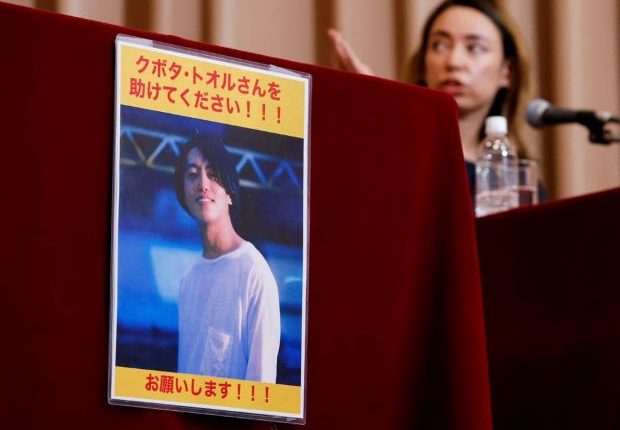Japanese filmmaker Toru Kubota sentenced to 10 years in Myanmar

By Seth Mydans
YANGON – A military court in Myanmar sentenced Japanese documentary filmmaker Toru Kubota to 10 years in prison Wednesday (5) for violating sedition and communications laws, his lawyer said.
Kubota, 26, was detained July 30 while filming a demonstration against the military that seized power in a coup last year, setting off widespread pro-democracy protests and a brutal crackdown. The military claimed Kubota entered the country on a tourist visa, rather than a journalist visa, and that he was participating in the demonstration and communicating with protesters while filming.
He was sentenced to three years for sedition and seven years for violation of an electronic transaction law. A court hearing on immigration law violations was scheduled for Oct. 12. His lawyer said Kubota was in good health.
The military also claimed that Kubota had previously disseminated false information about the Rohingya, a violently persecuted Muslim minority group. The Rohingya were forced to flee Myanmar by the hundreds of thousands to neighbouring Bangladesh.
In a brief and cautious statement, the Japanese Ministry of Foreign Affairs said, “We are aware that the trial of Mr. Toru Kubota, who is being detained in Insein Prison in Yangon, took place on Oct. 5,” and that he had been sentenced.
It went on: “The government of Japan will continue to appeal to the Myanmar authorities for the early release of Mr. Kubota. In addition, from the perspective of protecting Japanese nationals, the government of Japan has been providing support, such as consular visits and contacting his family, and will continue to take appropriate responses as much as possible.”
At a news briefing, Yoshihiko Isozaki, deputy chief Cabinet secretary, said the Japanese government had requested that authorities in Myanmar release Kubota sooner than the length of his sentence.
The statement from the Japanese was in line with the cautious approach the country has taken toward Myanmar over the years, attempting to mediate between Western nations and the ruling junta. “I’m hoping that this will be the final straw for Japan, because, traditionally, it has taken a soft approach to Myanmar,” said Teppei Kasai of Human Rights Watch in Japan.
“Even before the coup, they have tried to play the middleman between Western countries and the junta. Obviously, that was not effective. What Japan hasn’t done, but can do, is place targeted sanctions against Myanmar military leaders as well as Myanmar military-owned companies,” Kasai said.
After the coup on Feb. 1, 2021, Japan issued statements condemning the government takeover but declined to join Western nations in introducing sanctions, opting instead to freeze most non-humanitarian aid.
Kubota had made more than a dozen trips to Myanmar, focusing in part on the Rohingya, according to a GoFundMe page created for him by his friends. Kubota was in Myanmar this summer to work on a documentary “about the loneliness of a Burmese man,” the page said. In a statement posted on the page in September, Kubota thanked his supporters and said that Myanmar was “in an invisible war state. I hope you will keep an eye on people who live in this country.”
His sentencing is one of the harshest handed down since the coup and makes Kubota the fourth foreigner to be sentenced during that time, and the third who is currently being held. Sean Turnell, 57, an Australian economic adviser to Myanmar’s imprisoned civilian leader, Aung San Suu Kyi, was convicted of violating an official secrets law on Sept. 29 and sentenced to three years in prison.
Vicky Bowman, 56, a former British ambassador to Myanmar who later led an economic policy group there, was sentenced in late August to a year in prison, together with her Burmese husband, Htein Lin, for violating immigration law. Danny Fenster, an American journalist, was sentenced to 11 years in prison and then immediately freed and expelled in November 2021, after spending half a year in detention.
Kubota’s sentencing “marks a new low point in the junta’s assault on the press,” said Shawn Crispin, senior Southeast Asia representative for the Committee to Protect Journalists. “The ruling shows that no journalist, foreign or local, is safe from the regime’s arbitrary use of overbroad laws to stifle independent news reporting.”
In a statement, Amnesty International said, “With this latest verdict, Myanmar’s military is cementing its reputation as one of the top jailers of journalists in the world.”
-New York Times
A portrait photo of Japanese documentary filmmaker Toru Kubota, who has been detained in Myanmar after filming a protest that took place on July 30, 2022, is displayed during a news conference by his friends including a radio personality Nikki Tsukamoto Kininmonth to call for his release at Japan National Press Club in Tokyo, Japan August 3, 2022- Issei Kato/Reuters


Comments are closed, but trackbacks and pingbacks are open.